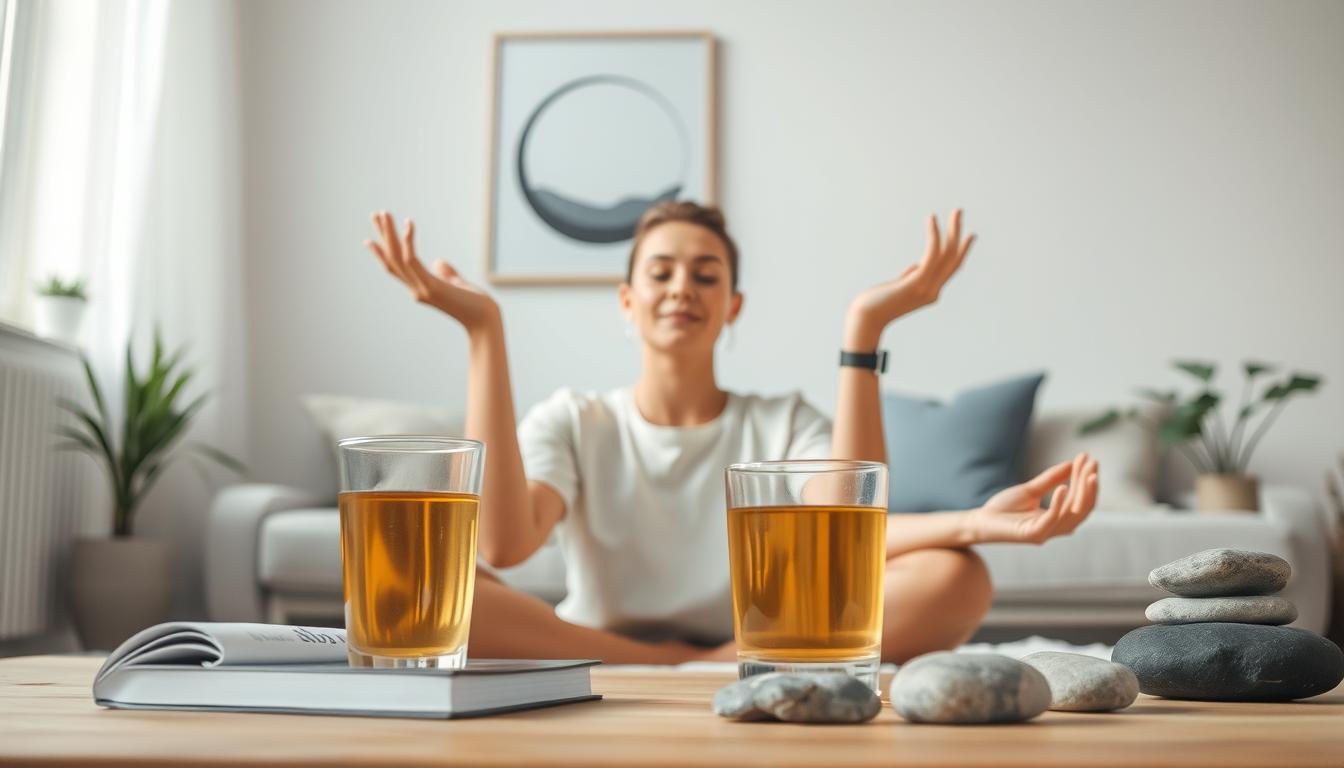I am a participant in the Amazon Services LLC Associates Program, an affiliate advertising program designed to provide a means for sites to earn advertising fees by advertising and linking to Amazon.com and affiliated sites. This post contains affiliate links. Privacy Policy
Effective Ways to Quickly Reduce Stress
Are you always feeling overwhelmed and finding it hard to manage your stress? In today’s fast world, it’s easy to get lost in the daily rush.
Managing stress is key for your mind and body. Luckily, there are many effective stress management techniques to help ease stress and boost health.

By adding simple stress relief tips and mindfulness practices to your day, you can cut down stress a lot. This can greatly improve your life quality.
Best brain supplement!
Key Takeaways
- Simple stress management techniques can be highly effective.
- Mindfulness practices can help reduce stress.
- Incorporating stress relief tips into daily routines is beneficial.
- Effective stress reduction strategies improve overall well-being.
- Coping with stress is crucial for mental health.
Understanding the Impact of Stress on Your Body and Mind
Stress doesn’t just mess with your mind; it affects your whole body. It’s a natural response to challenges, but too much stress can harm your health.
Physical Effects of Acute and Chronic Stress
Stress triggers hormones like cortisol and adrenaline. These hormones get your body ready to ‘fight or flight.’ This means your heart beats faster, blood pressure goes up, and you get more energy.
How Your Body Responds to Stressors
When you face a stressor, your hypothalamus kicks in. It releases hormones that prepare your body for action.
Cortisol’s role is key. It controls many body functions, like metabolism and the immune system. Too much cortisol can cause weight gain and weaken your immune system.
Warning Signs of Excessive Stress
Too much stress can show up in many ways, like:
- Headaches and migraines
- Muscle tension and pain
- Sleep disturbances
- Digestive problems
Spotting these signs early can help you manage stress better.
Psychological Consequences of Unmanaged Stress
Stress doesn’t just affect your body; it also messes with your mind. Chronic stress can change your brain, impacting mood, thinking, and emotions.
Cognitive Impacts: Focus, Memory, and Decision-Making
Stress can make it tough to focus, remember things, and decide. “Stress can cloud your judgment and reduce your ability to think clearly,” says Dr. Karen Young, a stress management expert.
Emotional Effects: Anxiety, Irritability, and Mood Changes
Stress can also mess with your emotions, causing more anxiety, irritability, and mood swings. It can even lead to mental health issues like depression and anxiety disorders.
“Chronic stress can have a profound impact on mental health, leading to increased symptoms of anxiety and depression.”
Dr. Lisa Damour, psychologist
Knowing how stress affects your body and mind is key. It shows why finding good stress relief methods and relaxation techniques for stress is so important.
How Can I Reduce Stress Quickly: Physical Techniques
There are many physical ways to fight stress fast. These methods calm your body and mind. They help you take back control over your stress.
Breathing Exercises for Immediate Stress Relief
Breathing exercises are a simple yet powerful way to reduce stress. They calm your nervous system and can be done anywhere.
4-7-8 Breathing Technique
The 4-7-8 breathing technique is easy. Breathe in through your nose for 4 seconds, hold for 7, and exhale for 8. It slows your heart rate and relaxes you.
Box Breathing Method
Box breathing is a simple pattern. Breathe in for 4 seconds, hold for 4, exhale for 4, and hold again for 4. It makes a box shape with your breath.
Diaphragmatic Breathing Practice
Diaphragmatic breathing uses your diaphragm. It slows your breathing and reduces stress.
Progressive Muscle Relaxation and Body Scans
Progressive muscle relaxation and body scans release tension. They involve tensing and relaxing muscles or focusing on body parts.
Full-Body Tension Release Sequence
This method starts with your toes and goes up to your head. It releases tension and relaxes you.
Quick 3-Minute Body Scan Meditation
A body scan meditation focuses on your body parts. Start with your toes and go up to your head, releasing tension as you go.
Physical Movement to Release Stress
Physical activity releases endorphins, or “feel-good” hormones. Activities like stretching, yoga, and walking are great for stress relief.
Desk-Friendly Stretches
Simple stretches at your desk can reduce tension and improve your mood.
Stress-Relieving Yoga Poses
Certain yoga poses reduce stress and promote relaxation. Downward-facing dog, child’s pose, and tree pose are good examples.
Walking Meditation Technique
Walking meditation focuses on your walking. Notice your feet touching the ground and your body moving. It helps you stay present and reduces stress.
| Technique | Description | Benefits |
|---|---|---|
| 4-7-8 Breathing | Breathe in for 4 seconds, hold for 7, exhale for 8 | Slows heart rate, promotes relaxation |
| Box Breathing | Breathe in, hold, exhale, hold (all for 4 seconds) | Creates a calming pattern, reduces stress |
| Progressive Muscle Relaxation | Tense and relax different muscle groups | Releases physical tension |
| Desk-Friendly Stretches | Simple stretches done at your desk | Reduces physical tension, improves mood |
Mental and Mindfulness Strategies for Rapid Stress Reduction
Mindfulness and mental strategies are great for managing stress. They help you stay calm and clear in stressful times. Adding these to your daily routine can make a big difference.
Guided Visualization and Imagery Techniques
Guided visualization uses your imagination to relax and reduce stress. It takes you to a peaceful place, away from daily worries.
Safe Place Visualization
Safe place visualization lets you imagine a place that feels safe and calm. It could be a beach, forest, or any place that relaxes you.
- Find a quiet and comfortable place to sit or lie down.
- Close your eyes and take deep breaths.
- Imagine yourself in your safe place, using all your senses to create a vivid mental picture.
Nature-Based Mental Imagery
Nature-based mental imagery uses natural scenes to relax you. Imagine a peaceful meadow, a serene lake, or a gentle forest glade.
Mindfulness Practices for Present-Moment Awareness
Mindfulness practices focus on the now, reducing worries about the past or future. They help you find calm and clarity.
5-4-3-2-1 Sensory Grounding Exercise
The 5-4-3-2-1 exercise helps you stay present by using your senses.
- Notice 5 things you can see around you.
- Acknowledge 4 things you can touch or feel.
- Identify 3 things you can hear.
- Recognize 2 things you can smell.
- Take 1 deep breath, focusing on the sensation.
Mindful Observation Practice
Mindful observation focuses on a single object, like a flower or candle flame. It’s calming and helps you stay present.
Cognitive Reframing: Changing Your Thought Patterns
Cognitive reframing changes how you think about stress. It helps reduce stress by changing your perspective.
Identifying Stress-Inducing Thoughts
The first step is to spot thoughts that stress you out. Once you know them, you can start to change them.
Creating Balanced Alternative Perspectives
After spotting stressful thoughts, find more balanced views. Look at the situation from different angles for a more positive or neutral view.
Lifestyle and Social Approaches to Stress Management
There are ways to manage stress that go beyond quick fixes. Changing your lifestyle and social habits can help a lot. Eating right, staying connected, and creating a calm environment are key.
Nutrition and Hydration for Stress Resilience
What you eat and drink affects how well you handle stress. A balanced diet keeps your mood and energy up. But, not drinking enough water can make you feel anxious and tired.
Stress-Reducing Foods and Beverages
Some foods and drinks can help you feel less stressed. Here are a few:
- Fatty Fish: Full of omega-3s, which lower stress hormones.
- Complex Carbohydrates: Foods like whole grain bread and oatmeal boost serotonin, helping you relax.
- Green Tea: It has L-theanine, which can calm you down.
- Nuts and Seeds: Almonds, sunflower seeds, and pumpkin seeds have magnesium, which helps manage stress.
| Food | Nutrient | Stress Relief Benefit |
|---|---|---|
| Fatty Fish | Omega-3 Fatty Acids | Reduces stress hormones |
| Complex Carbohydrates | Serotonin | Promotes relaxation |
| Green Tea | L-theanine | Reduces stress levels |
Foods and Substances to Avoid When Stressed
Some foods can make stress worse. It’s best to limit or avoid:
- Caffeine: Too much can make you anxious.
- Sugary Foods: They can make your blood sugar spike and then crash, stressing you out.
- Processed Foods: They’re often bad for your mood and energy.
“The food you eat can either be the safest and most powerful form of medicine, or the slowest form of poison.” – Ann Wigmore
Social Connection as Stress Relief
Talking to friends and family is crucial for your mental health. It can help you feel better and find new ways to deal with stress.
The Power of Talking It Out
Talking about your feelings can be very helpful. It lets you process your emotions and might lead to new solutions.
Building Your Support Network
Having strong social connections is key to managing stress. Here’s how to build them:
- Nurturing Existing Relationships: Stay in touch with loved ones.
- Joining Social Groups: Find groups that share your interests to meet new people.
- Seeking Professional Help: If stress is too much, talk to a mental health expert.
Creating Environmental Changes for Calm
Changing your environment can also help with stress. Simple changes can make your space more relaxing.
Decluttering Your Physical Space
Too much clutter can make you feel overwhelmed. Cleaning up your space can help you feel more in control and calm.
Using Sensory Tools: Music, Scent, and Light
Our senses can help us relax. Using calming music, scents, or soft lights can reduce stress and help you unwind.
By making these lifestyle and social changes, you can become more resilient to stress. This will improve your overall well-being.
Conclusion: Creating Your Personal Stress-Reduction Toolkit
Now that you’ve looked at many ways to manage stress, it’s time to make your own toolkit. Use breathing exercises, progressive muscle relaxation, and physical activity to start. These methods help you reduce stress quickly.
Try mental strategies like guided visualization, mindfulness, and changing how you think. These can help you feel better fast. Also, making healthy lifestyle choices like eating right, staying hydrated, and connecting with others can boost your stress-fighting abilities.
Try out different stress-reducing tips to see what works for you. This way, you can create a plan that keeps you calm and ready for anything. Remember, managing stress well is important for your happiness and health. With your toolkit, you’ll face life’s ups and downs with confidence and peace.
FAQ
What are some quick ways to reduce stress?
Try breathing exercises or progressive muscle relaxation. You can also do desk-friendly stretches and yoga poses to ease stress quickly.
How can mindfulness practices help with stress management?
Mindfulness helps by keeping you in the moment. Try guided visualization or the 5-4-3-2-1 exercise. These can make you feel calmer and less stressed.
What role does nutrition play in stress resilience?
Nutrition is key for handling stress. Foods rich in omega-3s can help, while sugary and caffeinated ones can make it worse.
How can I create a calm environment to reduce stress?
Make your space calm by decluttering. Use calming music, scents, and soft lights. These can help you relax and feel less stressed.
Why is social connection important for stress relief?
Talking to someone you trust is crucial. It builds a support network and helps share your feelings. This can ease stress and offer emotional support.
What is cognitive reframing, and how can it help with stress management?
Cognitive reframing changes negative thoughts into positive ones. It helps manage stress by altering your thinking patterns and reducing negative thoughts.
Can physical activity really help reduce stress quickly?
Yes, exercise like walking or yoga can quickly reduce stress. It releases endorphins, which boost your mood and distract you from stress.
How can I incorporate stress-reduction techniques into my daily life?
Start small with deep breathing or a quick body scan. Gradually add more practices like stretches or yoga. This builds a stress-reducing routine.
I am a participant in the Amazon Services LLC Associates Program, an affiliate advertising program designed to provide a means for sites to earn advertising fees by advertising and linking to Amazon.com and affiliated sites. This post contains affiliate links. Privacy Policy


